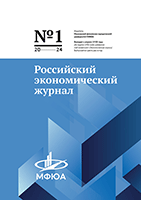Архив
Российский экономический журнал 4 / 2013
Abstracts of Main Articles
RUSSIAN ACADEMY OF SCIENCES - YET ANOTHER TARGET OF DESTRUCTIVE REFORMS
Author
Shvetsov A.N., Sc.D. (Economics), Professor, Deputy Director of Institute of Systems Analysis, RAS
Abstract
In placing RAS reform, behind the government draft law «On Russian Academy of Sciences, reorganisation of state academies of sciences and amendments to individual laws of the Russian Federation», on a par with the destructive transformations aimed at the final «sweeping purge» of the post-soviet heritage, the author interprets the project as a «sentence to not only RAS but also to Russia’s fundamental science». Suggested is an alternative version of reform aimed at extension and creative adaptation to the new conditions of the respective national (largely soviet) traditions rather than at copycatting the American (Anglo-Saxon) model of science organization. Hence, the argument in favor of the necessity of a much higher intra-academy democracy based primarily on a bigger administration autonomy of academic institutes. Some specific mechanisms are suggested to this account.
Key words
«RAS reform», «On Russian Academy of Sciences, reorganisation of state academies of sciences and amendments to individual laws of the Russian Federation» draft law», «American Anglo-Saxon model of science organization», «USA universities», «evaluation of research efficiency».
ABOUT SHAPING A NEW ECONOMIC MODEL: RESTRICTION OF BUDGET EXPENDITURES OR BETTER FISCAL PERFORMANCE?
Author
Petrov Yu.A., PhD (Economics), Head, Lab of financial and credit mechanisms of economic development, Central Economics and Mathematics Institute, RAS
Abstract
The author is against the restrictive way of handling the shortage of budget revenues for meeting the goals of national economic development and building a new economic model set forth on the topmost political level. Arguments in favor of necessity and possibility of higher fiscal performance are given, the respective priority measures are suggested.
Key words
«new model of Russia’s economic development», «RF President decree No. 596 «On long-term state economic policy», «new industrialization», «sequestering (restriction) of budget expenditures», «fiscal performance», «tax rates», «Washington consensus», «fiscal consolidation».
CONCERNING NECESSITY AND SUBSTANCE OF MACROECONOMIC POLICY CHANGE
Author
Savchenko E.S., Corresponding member of Russian Agricultural Academy, governor, Belgorod Oblast
Abstract
In linking, in his interview to the editors, the causes of the current sorry state of the national economy to the faulty macroeconomic, primarily exchange rate, policy pursued throughout the post-default period, the author argues the necessity of its change. The positive author’s suggestions include import substitution policy and reorientation of demand from international market to domestic one through devaluation of Russian rouble, necessarily complemented with a set of aggressive anti-inflationary and other measures promoting development of material production, production and social infrastructure.
Key words
«raw material producing economy», «macroeconomic policy», «exchange rate policy», «anti-inflationary policy», «competitiveness of Russia’s economy», «devaluation of Russian rouble», «import substitution», «CB refinancing rate».
LEGISLATIVE EMBODIMENT OF «DEAD» EDUCATION IDEOLOGY (ON ENTRY INTO FORCE OF FZ No.273
Author
Smolin O.N., Sc.D. (Philosophy), chairman of the Central Board of social movement «Education for All», president of «Znanie» society.
Abstract
In his interview to the editors the author challenges, in a detailed and multifaceted way, the contents of «Education in the Russian Federation» Federal Law No. 273, which entered into force on 1st September 2013, institutionalizing a radical reform of the education system in this country. Suggested as an alternative to this destructive and antimodernization document, as the author treats it, is a draft law «On public education» elaborated by «Education for All» social movement
Key words
«education reform», «Education in the Russian Federation» Federal Law No. 273-FZ», «draft law «On public education», «ministry of education and science of Russia», «Education for All» social movement».
POST-SOVIET AZERBAIJAN: PHASES, TRENDS ND PROSPECTS OF ECONOMIC DEVELOPMENT
Author
Pylin A.G., PhD (Economics) А.Г., research associate with Center for Post-Soviet Studies, Institute of Economics, RAS
Abstract
The article is yet another contribution to a series of publications by the employees of Center for Post-Soviet Studies, Institute of Economics, RAS, on socio-economic evolution of concrete exrepublics of the USSR (earlier Rossiisky Ekonomichesky Zhurnal carried materials devoted to Ukraine, Belarus, Baltic countries, Moldova, Georgia and Armenia). Following an analysis of the respective evolution of Azerbaijan, the author identifies the causes of the «Azerbaijan economic miracle» connected with a successful implementation of a strategy involving the use of oil-and-gas potential of the republic, as well as describes a new strategy of its economic development associated with national economy diversification by way of promoting growth of non-oil-and-gas industries.
Key words
«Azerbaijan Republic (AR)», «Nagorno-Karabakh conflict», «Turkey», «Armenia», «TRACECA corridor (Europe-Caucasus-Asia)», «railway «Baku-Tbilisi-Kars», «Azerbaijan-2020 concept: outlook into the future», «Aliev».
INTERNATIONAL EURO MARKET: RUSSIAN VECTOR OF EVOLUTION
Author
Kondratov D.I., PhD (Economics), senior researcher with Institute of Europe, RAS
Abstract
The article formulates some general considerations relative to history, the present and the foreseeable prospects of international euro market development creating prerequisite for the analysis of the Russian vector of its evolution. Reviewed are factors behind a wider use of Europe-wide currency in Russia, its real functions in the Russian market described, prospects and consequences of a large-scale euro introduction in our economy predicted, some recommendations for the national money authority substantiated.
Key words
«Eurozone», «Europe-wide currency», «European Union», «monetary integration», «international euro market», «Russian market of cash (non-cash) euro», «exchange rate policy of the Bank of Russia», «dual currency basket».

